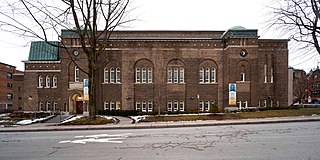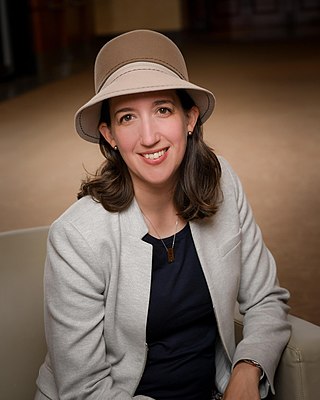
Sudbury, officially the City of Greater Sudbury, is the largest city in Northern Ontario by population, with a population of 166,004 at the 2021 Canadian Census. By land area, it is the largest in Ontario and the fifth largest in Canada. It is administratively a single-tier municipality and thus is not part of any district, county, or regional municipality. The City of Greater Sudbury is separate from, but entirely surrounded by the Sudbury District. The city is also referred to as "Grand Sudbury" among Francophones.

Central Synagogue is a notable Reform synagogue located at 652 Lexington Avenue, at the corner of East 55th Street in Midtown Manhattan, New York City. It was built in 1870–1872 and was designed by Henry Fernbach in the Moorish Revival style as a copy of Budapest's Dohány Street Synagogue. It has been in continuous use by a congregation longer than any other in the state of New York, except Congregation Berith Sholom in Troy, New York, and is among the oldest existing synagogue buildings in the United States.

The First Russian Congregation of Rodfei Sholem Anshei Kiev, known as the Kiever Synagogue or Kiever Shul, is a Modern Orthodox Jewish synagogue in Toronto, Ontario, Canada. It was founded by Jewish immigrants from Ukraine in 1912, and formally incorporated in 1914. The congregants were poor working-people, and services were led by members and held in their homes. Two houses were eventually purchased in the Kensington Market area, and in their place construction was completed on the current twin-domed Byzantine Revival building in 1927. The building was once the site of George Taylor Denison's home Bellevue.

The Jakab and Komor Square Synagogue in Subotica is a Hungarian Art Nouveau synagogue in Subotica, Serbia. It is the second largest synagogue in Europe after the Dohány Street Synagogue in Budapest. It was built in 1901-1902 during the administration of the Kingdom of Hungary, according to the plans of Marcell Komor and Dezső Jakab replacing a smaller and less elaborate synagogue. It is one of the finest surviving pieces of religious architecture in the art nouveau style. It served the local Neolog community.

Camp Ramah in Canada, is a Jewish summer camp located at Skeleton Lake in Utterson in Muskoka, Ontario, approximately two hours north of Toronto. Part of the National Ramah Commission, Ramah is affiliated with the United Synagogue of Conservative Judaism. Camp Ramah in Canada was founded in 1960, and attracts approximately 500 campers each year from Canada, the United States, the United Kingdom, and Israel.

Temple Emanu-El-Beth Sholom, Westmount is a Reform synagogue in Westmount, Quebec. It is the oldest “Liberal” or “Reform” synagogue in Canada, incorporated on March 30, 1883, and is the only Reform congregation in Quebec.
Synagogues may be considered "oldest" based on different criteria, and can be oldest in the sense of oldest surviving building, or oldest in the sense of oldest congregation. Some old synagogue buildings have been in continuous use as synagogues, while others have been converted to other purposes, and others, such as the Touro Synagogue, were shuttered for many decades. Some early established congregations have been in continuous existence, while other early congregations have ceased to exist.

The Bagg Street Shul or Beth Shloime is an Orthodox synagogue located at the intersection of Clark Street and Bagg Street in the Montreal Plateau region of Montreal, Quebec, Canada.

Anshei Minsk is a synagogue in the Kensington Market neighbourhood of Toronto, Ontario, Canada. It was founded in 1912 by poor Jewish immigrants from what is now Belarus, which at the time was part of the Russian Empire. The current Byzantine Revival building was completed in 1930.

Congregation Shaar Hashomayim is an Ashkenazi synagogue in Westmount, Quebec. Incorporated in 1846, it is the oldest traditional Ashkenazi synagogue in Canada and the largest traditional synagogue in Canada.

Rachel Kohl Finegold is a Montreal-based Open Orthodox Rabba at Congregation Shaar Haashomayim, and the first Orthodox woman to serve as synagogue clergy in Canada.

The Eglinton Theatre, is an event venue and cinema in Toronto, Ontario, Canada. In 2016, it was designated a National Historic Site by Parks Canada and the Historic Sites and Monuments Board of Canada.
Beth Tzedec Congregation is a Conservative synagogue on Bathurst Street in Toronto, Ontario, Canada. It was founded in 1955 with the amalgamation of the Goel Tzedec and Beth Hamidrash Hagadol Chevra Tehillim congregations, established respectively in 1883 and 1887. The synagogue has some 2,200 member units, representing over 4,000 members.
Avi Finegold is a Canadian rabbi in Montreal. In 2015, he founded the Jewish Learning Lab for adult Jewish education, and from July 2017 to 2018 served as interim rabbi of the Spanish and Portuguese Synagogue of Montreal. Finegold previously served as executive director of the Montreal Board of Rabbis.

Roxy Theatre was the final name of a theatre that operated from 1935 to 2006 at 1215 Danforth Avenue, in Toronto, Ontario, Canada's east end. It was designed by the architectural firm Kaplan & Sprachman, which designed dozens of neighbourhood cinemas, and opened under the name Allenby Theatre.

Harold Kaplan was a Canadian architect.
Abraham Sprachman was a Canadian architect. In 1922, he founded Kaplan & Sprachman with Harold Kaplan, which is mostly recognized for designing many movie theaters across Canada from the 1920s to the 1950s, and also for designing synagogues and buildings for the Jewish communities. His work was part of the architecture event in the art competition at the 1948 Summer Olympics.












